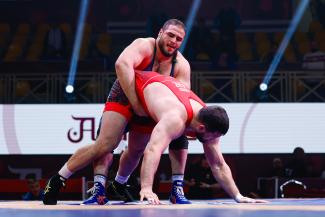NOVI SAD, Serbia (October 20) -- The eighth edition of the U23 World Championships begins in Novi Sad with around 700 wrestlers participating.
WATCH LIVE | LIVE MATCH ORDER | U23 WORLDS PREVIEW
14:25: Razmik KURDYAN (ARM) hangs on a 3-2 win over Artur SARKISJAN (CZE) at 130kg and reaches the semifinals. Sarkisjan with a challenge, asking for a foul but reviews show no foul. The lost challenge gives Kurdyan a clear 3-2 lead.
14:20: Vitalie ERIOMENCO (MDA), bronze medalist at the World Championships, makes his way to the semifinals at 63kg. He needs only three minutes and 26 seconds to beat Adham ELSAYED (EGY).
14:00: Yassine BEN LABED (POL) has surprised everyone with his performance here in Novi Sad. After beating Ruben GEVORGYAN (ARM) and Deni NAKAEV (GER), he now beats Brian RUIZ MARIN (VEN) 2-1 and marches into the semifinals at 87kg.
13:55: A 41-second technical superiority win for Fardin HEDAYATI (IRI) at 130kg. He scores a takedown and three turns from par terre to win 9-0
13:50: Levente LEVAI (HUN) into the semifinals at 77kg after a 3-1 win over Samvel TERTERYAN (ARM). A turn from par terre gave him a 3-0 lead and he escaped easily when he was put on par terre.
13:40: Doniyorkhon NAKIBOV (UZB) with a strong defense in the final minutes against Ahoura BOUVEIRI PIANI (IRI) and hands him a 2-1 loss at 77kg. Nakibov did not allow Bouveiri Piani any openings.
13:25: A quick win for world champion Gholamreza FAROKHI (IRI) against Leon RIVALTA (ITA) at 87kg. He works on a reverse lift before controlling Rivalta on the mat for the fall. He enters the semifinals.
13:02: Ziya BABASHOV (AZE) hands Iran its first loss of the tournament as he beats Mohammad ABOUTALEBI NAVID (IRI) 3-1 at 63kg. Aboutablebi Navid failed to score any points from par terre.
13:00: Defending champion Fardin HEDAYATI (IRI) scores three turns par terre after taking a 3-0 lead to start his campaign with a 9-0 technical superiority win at 130kg against Saba CHILASHVILI (GEO).
12:40: Vladimeri KARCHAIDZE (FRA) moves into the quarterfinal at 87kg with a 3-1 victory over Maksat SAILAU (KAZ). He got the turn from par terre while Sailau did not.
12:20: Levente LEVAI (HUN) looks unstoppable at 77kg. He posts his second win, 9-0, against Benjamin HANSEN (NOR) after using a trap-arm and finish the match
12:00: Ahoura BOUVEIRI PIANI (IRI) gets the first par terre against Yeldos KAMELOV (KAZ) and scores a turn to lead 3-0 but he steps out when trying to lift Kamelov again. Iran challenge the call but lose the challenge. Bouveiri Piani scores a takedown and stepout next but Kazakhstan challenge for a foul. Kazakhstan lose the challenge and Bouveiri Piani leads 7-2 at the break. A scramble but Kamelov scores the stepout. Bouveriri Piani answers with a takedown to lead 9-3, before going up one. A stepout makes it 10-5 and he hands on to his lead to win at 77kg.
11:55: Big match at 77kg as Alexandru SOLOVEI (MDA) faces Temuri ORJONIKIDZE (GEO). Solovei cannot score from par terre but Orjonikidze hits a four to lead 5-1 in the second period. Solovei scores back to back takedown to make it 5-5 but Orjonikidze leads on criteria with a minute left. Solovei with a stepout to make it 6-5. Georgia challenges the call, and on review, it is actually Solovei who stepped out and Orjonikidze who wins 6-5
11:20: Recent world bronze medalist Vitalie ERIOMENCO (MDA) rolls Nurdaulet KAPAS (KAZ) four times from par terre and gets a 9-0 win at 63kg.
11:05: European U23 silver medalist Vladimeri KARCHAIDZE (FRA) failed to score from par terre but he manages a takedown before the break to lead 3-0 against Mahmoud IBRAHIM (EGY). He counters Ibrahim from par terre in the second period and holds his 6-1 lead to win at 87kg.
10:55: World 82kg champion Gholamreza FAROKHI (IRI) makes his debut at 87kg and rolls to a 8-0 technical superiority win over Lachin VALIYEV (AZE).
10:35: Samvel TERTERYAN (ARM) took a 5-0 lead and was going to hang on to it before Isami HORIKITA (JPN) mounted a comeback. But the Japanese wrestler could score only four points and Terteryan won 5-4 at 77kg
10:25: European champion at 72kg Levente LEVAI (HUN) begins with a 5-0 blanking of Davud MAMMADOV (AZE) at 77kg in Novi Sad.
10:00: Welcome to day one of the U23 World Championships in Novi Sad. Greco-Roman action will kick off with 63kg, 77kg, 87kg and 130kg.



Share your thoughts.
Comments